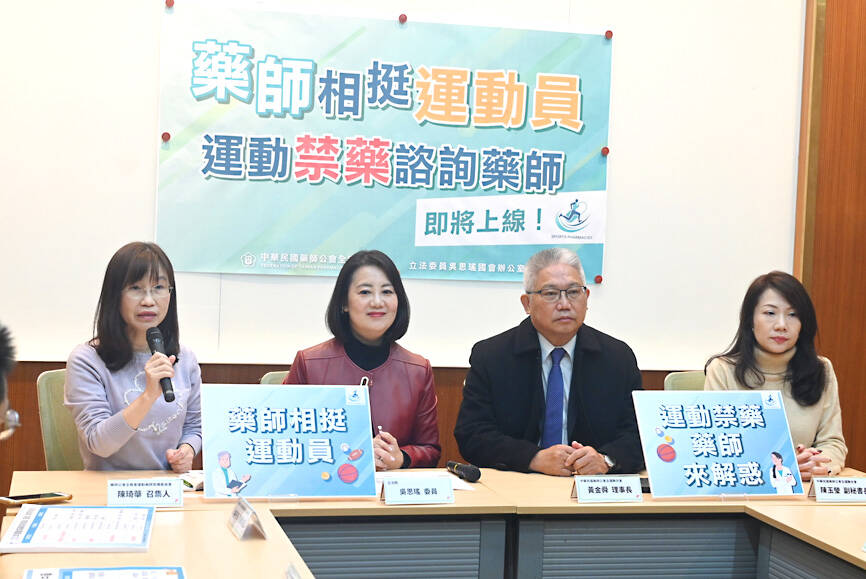The Federation of Taiwan Pharmacists Associations (FTPA) yesterday said it has begun training pharmacists to provide consultations on substanced banned in athletics, with 142 certified sports pharmacists having obtained certification.
Athletes are encouraged to consult with them before heading to competitions.
FTPA chairman Huang Jin-shun (黃金舜) said the World Anti-Doping Agency (WADA) publishes its List of Prohibited Substances and Methods each year, which includes substances that are prohibited either at all times or in-competition, which might lead to confusion. As such, many athletes have in the past few years contacted the federation, asking about proper drug use.

Photo: Wang Yi-sung, Taipei Times
Huang said that with help from Democratic Progressive Party (DPP) Legislator Rosalia Wu (吳思瑤), the federation received funding from the Sports Administration and launched a training program on drugs banned in athletics for pharmacists last year.
Referencing Japan’s sports pharmacist system, the federation worked with the Chinese Taipei Anti-Doping Agency in holding training courses this year, which instruct the pharmacists on the WADA code, the list, therapeutic use exemptions, drug testing, results management and related knowledge. Pharmacists must also pass an end-of-program exam to receive certification.
“There are now 142 pharmacists that passed the exam and can assist Taiwan’s athletes,” Huang said, adding that their names are listed on the FTPA’s Web site and that the federation plans to train about 200 sports pharmacists next year, hoping some of them could accompany Taiwanese athletes to the Paris Summer Olympics next year.
The federation’s Sports Pharmacists Preparatory Committee convener, Chen Chi-hua (陳琦華), said that many substances are prohibited for athletes, either at all times or in-competition, including some Chinese herbal medicines and health supplements, so having specialized pharmacists to help athletes screen drug use would enable athletes to compete without fear of accidental doping.
For example, she said that pseudoephedrine — used to relieve nasal or sinus congestion — is prohibited in-competition, while beta-2 agonists — used to treat asthma; acetazolamide — for treating high pressure inside the eye and potassium-sparing diuretics — for treating hormonal acne in women — are prohibited at all times, she said.
There was a case in which an athlete had a fever before competing abroad and was considering forfeiting the competition, but with the help of a pharmacist who selected proper medications, the athlete participated and won a bronze medal, Chen said.
Each Japanese athlete is accompanied by a sports pharmacist when they compete, but Taiwanese athletes are only accompanied by physicians and physical therapists, so hopefully the Sports Administration could consider having sports pharmacists accompany athletes to international games, Huang said.
Sports pharmacists could join athletic trainers, coaches and counselors in assisting Taiwanese athletes, and although there are only 142 certified sports pharmacists so far, an “adoption” mechanism could be used, with pharmacists keeping track of certain athletes’ long-term drug use and helping to examine the drugs and supplements athletes take abroad before they head to international competitions, Wu said.

Police have issued warnings against traveling to Cambodia or Thailand when others have paid for the travel fare in light of increasing cases of teenagers, middle-aged and elderly people being tricked into traveling to these countries and then being held for ransom. Recounting their ordeal, one victim on Monday said she was asked by a friend to visit Thailand and help set up a bank account there, for which they would be paid NT$70,000 to NT$100,000 (US$2,136 to US$3,051). The victim said she had not found it strange that her friend was not coming along on the trip, adding that when she

INFRASTRUCTURE: Work on the second segment, from Kaohsiung to Pingtung, is expected to begin in 2028 and be completed by 2039, the railway bureau said Planned high-speed rail (HSR) extensions would blanket Taiwan proper in four 90-minute commute blocs to facilitate regional economic and livelihood integration, Railway Bureau Deputy Director-General Yang Cheng-chun (楊正君) said in an interview published yesterday. A project to extend the high-speed rail from Zuoying Station in Kaohsiung to Pingtung County’s Lioukuaicuo Township (六塊厝) is the first part of the bureau’s greater plan to expand rail coverage, he told the Liberty Times (sister paper of the Taipei Times). The bureau’s long-term plan is to build a loop to circle Taiwan proper that would consist of four sections running from Taipei to Hualien, Hualien to

The Civil Aviation Administration yesterday said that it is considering punishments for China Airlines (CAL) and Starlux Airlines for making hard landings and overworking their cabin crew when the nation was hit by Typhoon Kong-rey in October last year. The civil aviation authority launched an investigation after media reported that many airlines were forced to divert their flights to different airports or go around after failing to land when the typhoon affected the nation on Oct. 30 and 31 last year. The agency reviewed 503 flights dispatched by Taiwanese airlines during those two days, as well as weather data, flight hours

Three people have had their citizenship revoked after authorities confirmed that they hold Chinese ID cards, Mainland Affairs Council (MAC) Deputy Minister and spokesman Liang Wen-chieh (梁文傑) said yesterday. Two of the three people were featured in a recent video about Beijing’s “united front” tactics by YouTuber Pa Chiung (八炯) and Taiwanese rapper Chen Po-yuan (陳柏源), including Su Shi-en (蘇士恩), who displayed a Chinese ID card in the video, and taekwondo athlete Lee Tung-hsien (李東憲), who mentioned he had obtained a Chinese ID card in a telephone call with Chen, Liang told the council’s weekly news conference. Lee, who reportedly worked in